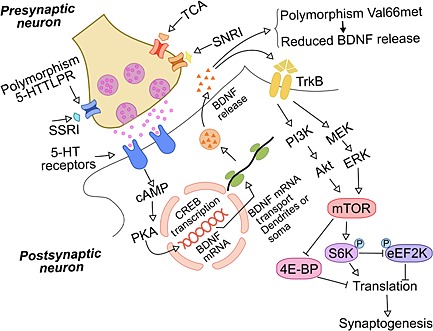Figure 2.

Mechanisms involved in the delay of therapeutic response to classic antidepressants in MDD patients. The classic antidepressants, which inhibit the re‐uptake of monoamines, increase the availability of serotonin, norepinephrine and dopamine in the synaptic cleft. The activation of serotonergic receptors (example above) triggers the internal cellular signalling that leads to CREB activity and BDNF transcription. The synthesis and release of BDNF from the transcription process activates TrkB receptors and downstream mTOR signalling pathway, which coincides with the therapeutic response. Activated mTOR triggers the translational machinery, increasing protein synthesis involved in synaptogenesis. Genetic polymorphisms of the serotonin transporter and BDNF are involved in resistance to classical antidepressant treatment in some people. These genetic traits may be at least one of the possible mechanisms related to refractory to classical treatments. MDD, major depressive disorder; 5‐HTTLPR, serotonin‐transporter‐linked polymorphic region; Val66met BDNF single‐nucleotide polymorphism; SSRI, selective serotonin re‐uptake inhibitors; SNRI, serotonin‐norepinephrine re‐uptake inhibitors; TCA, tricyclic antidepressants; BDNF, brain‐derived neurotrophic factor; TrkB, tropomyosin‐related kinase B receptor; mTOR, mammalian target of rapamycin; PI3K, phosphatidylinositol‐3‐kinase; ERK, extracellular signal‐regulated kinase; MEK, mitogen‐activated protein kinase; Akt, protein kinase B (PKB); S6K, ribosomal protein S6 kinase; eEF2K, eukaryotic elongation factor‐2 kinase; 4E‐BP, eukaryotic initiation factor 4E (eIF4E)‐binding proteins; cAMP, cyclic adenosine monophosphate; PKA, protein kinase A; CREB, cAMP response element‐binding protein
